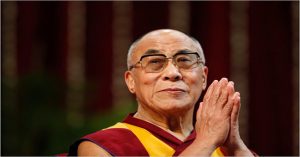 Chinese students studying at the University of California, San Diego (UCSD) are rallying. The issue — an upcoming visit from His Holiness the Dalai Lama who is due to make a keynote speech at the university in June.
Chinese students studying at the University of California, San Diego (UCSD) are rallying. The issue — an upcoming visit from His Holiness the Dalai Lama who is due to make a keynote speech at the university in June.
Almost immediately after the news was announced, the San Diego branch of the Chinese Students and Scholars Association (CSSA) protested, demanding a meeting with the university chancellor and claiming that it had already been in touch with the Chinese consulate.
John Li, a UCSD student and key member of the CSSA maintained that they will not ask the chancellor to disinvite His Holiness. They will, however, urge him to “send out statements clarifying the content of Dalai Lama’s speech,” “make sure it has nothing to do with politics,” and “stop using words like ‘spiritual leader’ and ‘exile’”.
Chinese animosity against His Holiness the Dalai Lama is, of course, nothing new, and similar protests on account of his being a “divisive political figure,” have occurred before. New to the argument, however, is the assertion that his appearance in June will contravene the university’s commitment to diversity and political correctness.
In their statement, released on messaging app WeChat, the CSSA claimed that the invitation “contravened the spirit of respect, tolerance, equality and earnestness” so integral to the university — rhetoric that reflects that of mainland China’s Communist Party. More Chinese students are studying in America than ever before, and this, combined with a general swell in campus activism across the country could explain why they feel determined to make their voices heard.
The University Chancellor has since made it clear that the Dalai Lama’s visit will take place, and has said that the Dalai Lama’s speech would be apolitical.
Dr Tsering Topgyal is a Tibetan native who received his master’s degree at UCSD and lived with Chinese students there in the early 2000s. He believes that inviting the Dalai Lama a decade ago would not have stirred up such controversy. While many Chinese students would have felt discomfort privately, “they were not as organised as they are today, or [as emboldened] on account of their country’s rise in the global hierarchy,” he said.
And China’s climb up the power ladder has resulted in the country trying increasingly to influence American educational institutes. Following the recent protests, for example, Global Times, a state-run Chinese newspaper, urged the institution to correct the “misconception on the history of Tibet.”
The CSSA represents students at dozens of universities, and its seemingly close links with the Chinese government could be taken as a sign that the country’s foothold in American universities is growing.




 Print
Print Email
Email